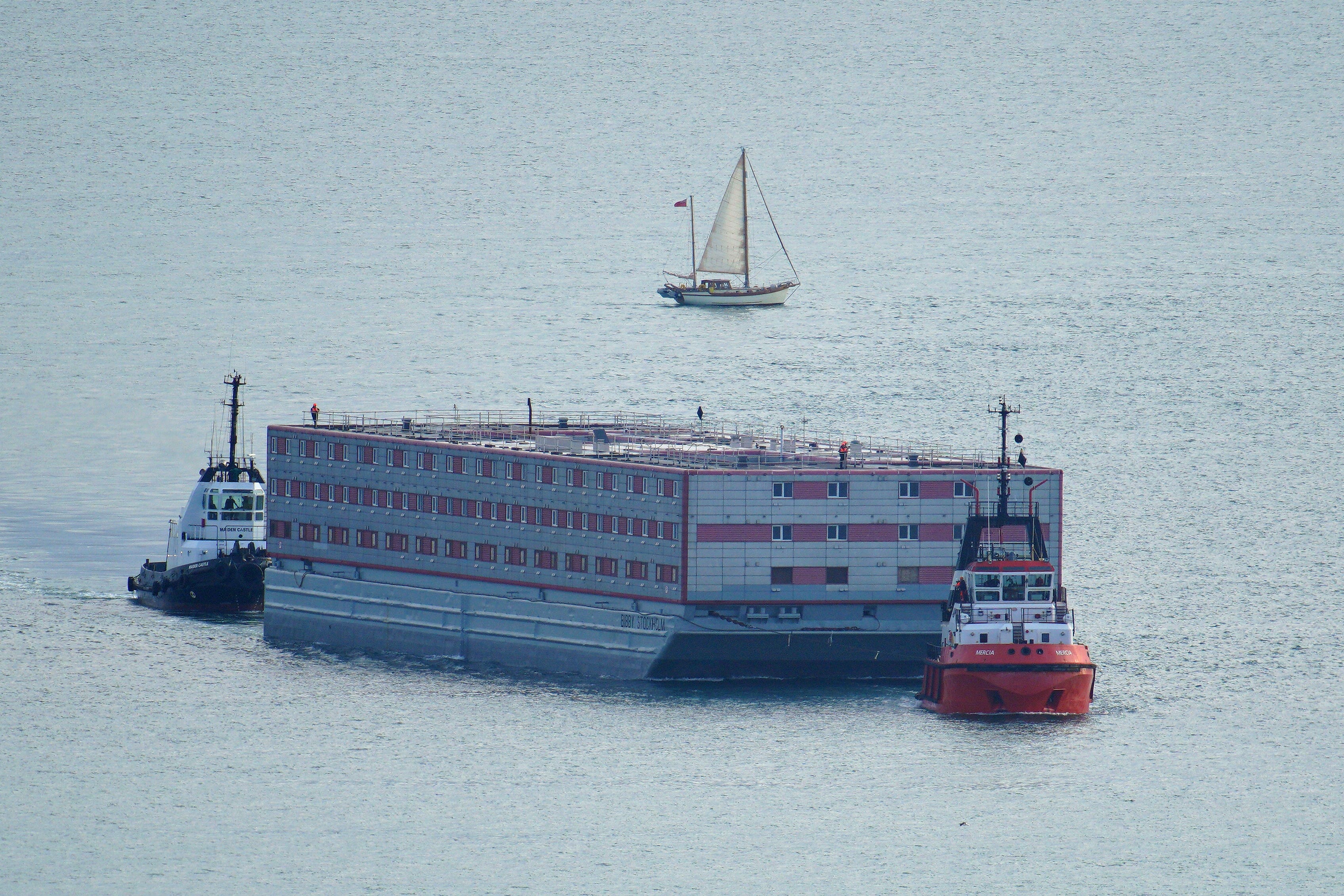Bibby barge arrives in port after Government sees off challenge to asylum plans
The accommodation barge set to house 500 asylum seekers arrived in Portland Port on Tuesday morning.

Your support helps us to tell the story
From reproductive rights to climate change to Big Tech, The Independent is on the ground when the story is developing. Whether it's investigating the financials of Elon Musk's pro-Trump PAC or producing our latest documentary, 'The A Word', which shines a light on the American women fighting for reproductive rights, we know how important it is to parse out the facts from the messaging.
At such a critical moment in US history, we need reporters on the ground. Your donation allows us to keep sending journalists to speak to both sides of the story.
The Independent is trusted by Americans across the entire political spectrum. And unlike many other quality news outlets, we choose not to lock Americans out of our reporting and analysis with paywalls. We believe quality journalism should be available to everyone, paid for by those who can afford it.
Your support makes all the difference.An accommodation barge has belatedly arrived at the port where it will house 500 asylum seekers as the Government’s migration plans were poised to become law after ministers saw off fresh challenges by peers.
Bibby Stockholm was pulled by a tug into Dorset’s Portland Port on Tuesday morning, with the proposals to use it to house migrants under Rishi Sunak’s bid to “stop the boats” crossing the Channel a month behind schedule.
The barge’s arrival came after a night of drama in which the Tory frontbench saw off five further changes being sought by the unelected chamber to the Illegal Migration Bill, including modern slavery protections and child detention limits.
At least one other vote was ditched in the face of the Government victories.
The Archbishop of Canterbury Justin Welby, who has been a strident critic of the Bill, also dropped his demand for a statement on tackling the refugee problem and human trafficking to the UK, after a similar proposal was rejected by MPs.
It marked a shock ending to the parliamentary tussle over the flagship reforms that had threatened to go to the wire ahead of the summer recess.
The cessation of the stand-off between the unelected chamber and MPs during so-called ping-pong – where legislation is batted between the Lords and Commons until agreement is reached – paves the way for the Bill to receive royal assent.
The reforms are a key part of Prime Minister Rishi Sunak’s bid to deter people from making hazardous Channel crossings.
They will prevent people from claiming asylum in the UK if they arrive through unauthorised means.
The Government also hopes the changes will ensure detained people are promptly removed, either to their home country or a third country such as Rwanda, which is currently the subject of a legal challenge.
But the Bill encountered fierce opposition in the upper chamber, which was accused of trying to “drive a coach and horses” through the contentious plans.
In turn, the Government faced claims of seeking to deliver a “punishment beating” to peers for challenging the plans.
If people know there is no way for them to stay in the UK, they won’t risk their lives and pay criminals thousands of pounds to arrive here illegally
Ministers had urged the Lords to allow the Bill to become law after signalling no further concessions were planned and MPs again overturned a raft of revisions previously made by the upper chamber.
Home Office minister Lord Murray of Blidworth said the number of small boat arrivals had “overwhelmed” the UK’s asylum system and was costing taxpayers £6 million a day to provide accommodation.
He told peers: “With over 45,000 people making dangerous Channel crossings last year this is simply no longer sustainable.
“If people know there is no way for them to stay in the UK, they won’t risk their lives and pay criminals thousands of pounds to arrive here illegally.
“It is therefore only right that we stop the boats and break the business model of the criminal gangs exploiting vulnerable people, ultimately enabling the Government to have greater capacity to provide a safe haven for those at risk of war and persecution.”
He urged the Lords to “respect the will of the elected House and the British people by passing this Bill”.
But while he agreed on the need to stop the small boat crossings, Mr Welby said: “I fail to see how this (the Bill) does it and I have not heard anything to convince me.
“But that is the view of the other place. I agree that in the end on most things, except the most essential, that this House must give way to the other place.”
He added: “The problem with the Bill is that it has not started at the right place. Where it needed to start with is… to have a level of national consensus and agreement on what the aim of our migration policy and immigration policy is in the long term.”
The Bibby barge left Falmouth, Cornwall, on Monday after undergoing work to prepare it for its new role.
But locals in Dorset have raised concerns about the Portland site being used to house asylum seekers.
Downing Street defended the use of barges to house migrants, insisting it is a cheaper alternative to housing them in hotels.
The first asylum seekers are expected to board the Bibby Stockholm later this month.
Meanwhile, the Home Office said one man was being treated for scabies at Wethersfield Airfield in Essex which came into use as asylum seeker accommodation last week.